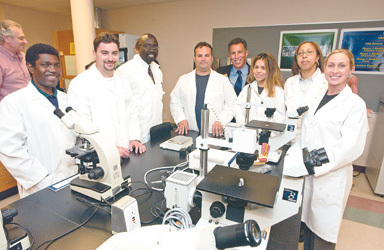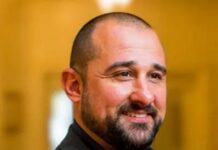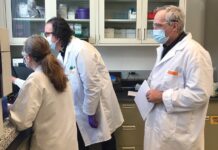
Laid off from his shift at a micro-electronics company in 2003, Harrisville
resident Jeff Dunham decided to return to school, but was unsure of exactly
what direction he wanted his career to head.
And he was even more unsure of whether the courses he started taking through the Internet would lead him to employment. It was actually his wife who first heard about the new biotechnology manufacturing program being launched at the University of Rhode Island’s Feinstein Providence Campus that fall.
Dunham joined the program, which is designed to allow students to find full-time employment following their first year of classes and a summer internship with a local biotech company.
Now employed at Nephros Therapeutics Inc., Dunham is continuing to take classes part time to pursue a degree and was among several of the first class’s dozen students who returned on Sept. 20 for a ribbon-cutting ceremony for the officially completed biotechnology manufacturing training laboratory (students had worked in a partially completed version last spring). Guests at the event included the legislators and biotech companies who helped fund and equip the $560,000 facility.
“Look at these groups of students,” said Dunham, who is in his mid-40s, gesturing to his classmates and the dozen students who make up the second year of the program. “We’re not 19 or 20 years old. It would be difficult, if not impossible, at my point in life to give up employment for four years of classes.”
The event came about 18 months after URI launched its biotechnology initiative, aimed at producing students who can immediately go to work for the industry giants the state is looking to attract. URI President Robert Carothers said the Providence lab is the first visible piece of the effort and he pointed to voter approval of bond referendum No. 13 on Election Day, for construction of a $50 million Center for Biotechnology and Life Sciences on the Kingston Campus, being the next piece of the initiative.
Gov. Don Carcieri also spoke, talking about his hope that alongside Boston, the region will one day be regarded in the same light as Silicon Valley was for electronic components.
Jeffrey Seemann, dean of the university’s College of the Environment and Life Sciences, said the program allows the students to be competitive for some of the best-paying, most available jobs in the state, while John McCray, vice provost for urban programs at the Providence campus, said the program illustrates the willingness of URI as an academic institution to evolve with the times.
The lab’s price tag came mostly down to acquiring the costly equipment needed for training. A $300,000 grant from the state, another $100,000 from the state Human Resource Investment Council and $25,000 from Amgen were directed to the facility over the past year. The final pieces of the project arrived in August, in the form of two bio-reactors from Pfizer, valued at about $100,000, which are used to grow cell cultures in commercial quantities.
Other significant equipment donations came from Amgen (a $30,000 organic carbon analyzer) and Pall Scientific Corp. (a $3,200 purification system).
Other equipment on the site includes a shaking incubator to aerate liquid cultures, a centrifuge to aid in collecting cultured cells, protein separation and purification equipment, an ultra-low temperature freezer and two kinds of microscopes.
Local biotechnology companies that took student interns during the summer included Amgen in West Greenwich, Providence’s eMembrane Inc., West Kingston’s Hybrigene Inc. and Lincoln’s Nephros Therapeutics Inc. and Neurotech USA Inc. Spherics Inc. of Lincoln also assisted with curriculum development.
Speaking to the new batch of students in the program, Dunham offered words of encouragement and advice about learning to block out outside influences – including kids and housework – and stay with their heads in their books.
“It’ll pay off, trust me. … This will be the best thing you’ve done in your
whole life,” Dunham said. And speaking to the industry representatives gathered,
he added, “If your company can’t hire them all, go tell your competitors to
grab these students, because they’re going to do good work for your company.”












